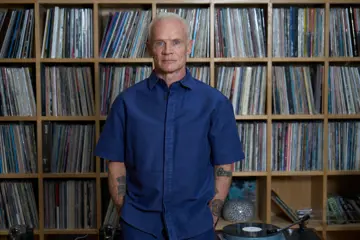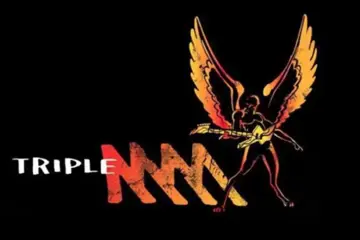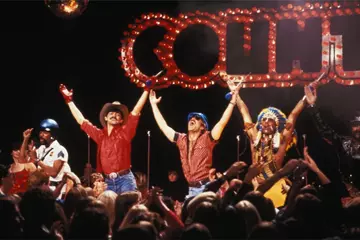 Screamfeeder
ScreamfeederThe vinyl resurgence has proved a wonderful musical renaissance on so many levels, not least because it’s prompted a heap of cool bands to reissue their entire catalogue on wax. Case in point is Brisbane indie darlings Screamfeeder, who carved a swathe through the thriving ‘90s guitar underground with their brash but beautiful music, but who have become something of a part-time concern in recent years.
Now, however, excellent Melbourne label Poison City Records are re-releasing the entire Screamfeeder catalogue on vinyl – comprising Flour (1992), Burn Out Your Name (1993), Fill Yourself With Music (1995), Kitten Licks (1996), Rocks On The Soul (2000), Take You Apart (2003) and the 1999 covers EP Home Age – and this has once more shined a light on one of our most cherished homegrown products of that era.
“We’re not really doing [the reissues] ourselves, it’s all Poison City – we’re just taking a backseat, really,” explains frontman Tim Steward. “We played one of their [Poison City] Weekender shows back in 2008 or 2009 or something, and one of the guys started chatting about it. Then about a year ago another chap from Sydney who runs a label called Blind Records approached me and said, ‘What do you think of this idea of re-releasing your entire catalogue [on vinyl]?’, and I was, like, ‘Yeah, that would be good’, but then I thought that Poison City might still want to do it, so I ran it by them and they were keen – and they’re a much more established organisation – so they went for it, and the guy [from Blind] was cool with it, so it all just fell into place.”
Is the reissue project something that they’d been thinking about themselves or was it more a fortunate chain of events?

“It was just an opportunity,” Steward admits. “As far as Screamfeeder goes we did the Kitten Licks tour [in 2009] and we did the B-sides album [2011’s Cargo Embargo] and then in the meantime I’ve been assembling all of our demos – I want to do a demos album, but it’s this colossal project because I’ve got about 60 songs sitting there already, it’s just going to be massive – so I’ve been thinking about that. Then the reissue thing popped up and I just thought, ‘Man, it’s been twenty years-plus, why don’t we do that as well?’
Has it been enjoyable revisiting their relative youth in this fashion?
Don't miss a beat with our FREE daily newsletter
“Yeah, I never listen to those albums anymore ever, so to put them on again was, like, ‘Oh my God!’” Steward admits. “And there’s certain songs on there that I’d completely forgotten about, and I’d go, ‘That sounds completely amazing, I haven’t heard that in over a decade!’ It’s nice because you’re not listening to the album with the critical ears of the guy who recorded it, you’re just listening as a punter, really, so it’s quite enjoyable. It’s nice because at the time we were very critical of our performances and our sounds or whatnot, and we were always going, ‘That could have been better’, or ‘I wish that that part was faster or louder or softer or slower or whatever it was’. It’s nice to ignore all of those feelings now – not even have them – and just listen to the songs and enjoy them.”
It’s also an interesting process for long-term fans to revisit the entire catalogue, this walk down memory lane abetted by the album liner notes which discuss the relative eras. For instance, it was a footnote in history how Screamfeeder revisited their debut Flour a few years later and gave it a complete overhaul, but Steward tells that this was mainly a product of their initial naivete.
“It was just that the singing on it was really shit,” he laughs. “Also the first time around we didn’t even get it mastered, we just recorded it and send the DATs down to [then label] Survival in Sydney and they just pressed it up – no one said to us, ‘Oh, should we master the album?’ We didn’t even know that you did that! So we thought, ‘Yeah, maybe we should treat this with a bit more care’, and we had the opportunity to do it so we just did it.”
As soon as we got Flour released and we started going on tour, everything shifted into fifth gear and the floodgates opened
What about the follow-up, Burn Out Your Name? Does that seem like a more contemporary proposition?
“On one hand, it does — I can remember going to the recording sessions every day and stuff like that — but on the other hand you think back to that era and it’s like another lifetime almost,” Steward reflects. “I was living in Heussler Terrace in Milton back then and Tony [Blades] was living there as well – our [original] drummer – and I think that Kellie [Lloyd – bass] was living there for a while too. I’m not sure if we lived together at the same time, the three of us. But it was just a really fast time – we did Flour and Flour had taken forever, because it was half the songs from the old band [The Madmen], and a few songs from when we lived in Townsville, so as soon as we got Flour released and we started going on tour, everything shifted into fifth gear and the floodgates opened and we just wrote tons of songs. We were going to practice three or four times a week and it all just happened really naturally and flowed really fast. We had the songs, we recorded them all and they all went on the album – it was just really simple and easy.”
It must have been a quite remarkable creative period, given that the first four albums all dropped in the space of under five years.
“Yeah, I guess so,” Steward shrugs. “I guess I grew up on punk stuff and the punk bands didn’t fuck around; they’d release one album every year. Old bands like the Stones might do one album every six months, and you had The Clash putting out London Calling and Sandanista! within nine months of each other, and that’s like ten sides of vinyl. Then you had Hüsker Dü recording an album every nine months in the States and going on tour all of the time as well, so it sort of just felt that it was a reasonable pace to just write a song and week and pump them out.”
During the process of revisiting this era has there been any music that Steward has been reacquainted with that he hasn’t enjoyed listening to?
“Not really,” he offers. “Fill Yourself With Music is sort of the one where we approached the mixing and the production in the most slacker kind of way I guess, so there are certain moments on there that I wish we’d paid more attention to and actually done more than one take of things to erase the mistakes and things, but you know – it is what it is.”
The albums have also been re-mastered specifically for vinyl, and you don’t need to be an audiophile to appreciate the sonic improvement.
“Yeah it does sound a bit better,” Steward agrees. “Bryce [Moorehead] re-mastered Fill Yourself With Music and Kitten Licks, and he paid heaps of attention to it and got them sounding tons better – it’s all subtle, but when you listen to one from the other you can tell that it’s had a lot more care paid to it.”

The Brisbane scene in the early ‘90s was super vibrant, with bands such as Powderfinger, Custard, Regurgitator and dozens of other lesser-known lights all cutting their teeth at once – this era is talked about a lot, but could Steward tell at the time that there was something special happening?
“I guess it’s hard to tell whether something’s special at the time because you don’t stop to think about it, and it’s only in retrospect where you go, ‘Wow, that was something really fantastic where things all coalesced and people’s creative juices were really allowed to flow’, “ the frontman reflects. “So at the time you just don’t stop to think about it – it would actually weird to step back and go, ‘Let’s analyse this and work out whether it’s really cool or not’. You’re just busy, and your mission every morning is just to get up and just work and keep going with it and book and write and rehearse and all of that stuff – I think that’s the only way you can be.
Was it competitive amongst these bands or were they bonded by a sense of community?
“I reckon there was more community with people encouraging each other and things like that,” Steward remembers. “But the most nostalgic memory of that whole time was that it was such a naïve, beautiful kind of thing. The internet is great and I love it, but pre-internet had this lovely naivete in the whole way we lived and the way we shared music and the way we shared ideas and approached art and everything. It’s like a boxing glove in the face the way that the internet has changed everything that we do, all day long. So that was the sweetest thing about it, the way that it was innocent and naïve and sort of exploratory.
“It was great, and I think that the bands had opportunities to play and the audiences were really active and kind of encouraged, but also everyone was hungry because we were young – everyone was like twenty so everyone was fucking really hungry for it and really going for it.”
Does he recall Screamfeeder being ambitious in that regard?
“Oh, shit yeah!” Steward thunders. “Our booker, Tony, we’d walk through the door – like Kellie would come home from work or something – and he’d go, ‘Don’t be locking anything in at work, you’re going on tour for a whole month!’ She’d not be offered a choice in it, it was just what was happening. And he’d say, ‘And two weeks after that we’re doing another two-week tour’ and we’d just be, like, ‘Okay! That’s fine’. Then we’d go to practice and if there wasn’t a new song working we’d be, like, ‘This is weird, why are no new songs coming through?’ That was what was fun about it, we were mega-driven.”
There was always a pretty tangible chemistry in the Screamfeeder ranks, so this productivity is hardly surprising.
“Oh yeah, with the first incarnation the chemistry was sort of intense and vaguely competitive, but not in a way that impacted the creativity,” Steward concurs. “It was these three personalities just driving each other forward, but when Dean [Shwereb – drums] joined the band [in 1995] it was different because we all gelled a bit more and it was a bit more harmonic. It was creativity with a different impetus I guess – it was fun, it just became much more fun.”
The members are busy with different projects these days but, with this resurgence of interest in Screamfeeder and their compelling music in recent times, could Steward ever imagine them reconvening to make new music?
“Yeah, we actually had a couple of rehearsals about six months ago and just set up mics in the studio and recorded a whole four-hour session,” he divulges. “There are an absolute ton of awesome ideas that we just jammed on, and we just went, ‘Holy shit, this is cool!’ It all fell into place really easily, so I’d suggest that it’s almost definitely going to happen. It’s just a totally different thing, we’ll all just walk into a room together and half an hour later there’s songs on the table. It’s just how it works with us.”















